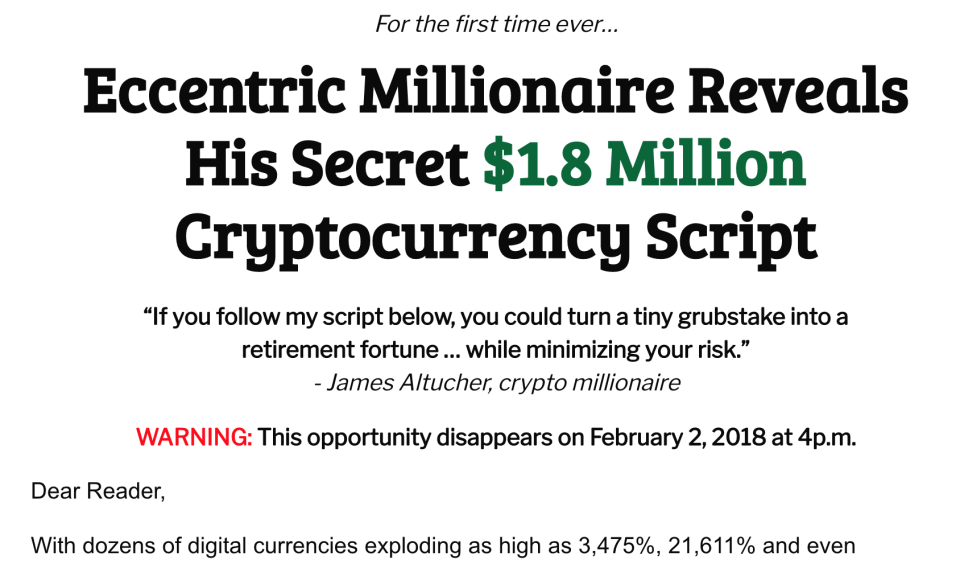Meet the man behind those ‘bitcoin genius’ ads all over the internet
There is an advertisement online that’s been stalking people as they surf around the internet. You’ve probably seen them, too: A man with wild hair and wire-rimmed glasses, staring out into the beyond, with bitcoin logos next to his face.
The ad might say something like “Crypto-Genius Reveals the ‘Next Bitcoin’” or “California genius says, this is the next bitcoin.” Some even use a variation on the classic clickbait syntax: “bitcoin won’t want you knowing this cryptocurrency,” as if bitcoin were a corporation, trainer, or language professor.
The “crypto genius” is James Altucher, who boasts an impressive resume of hedge fund employment, books, venture capitalist exits, and media appearances. The ads are for Choose Yourself Financial, a financial newsletter subscription service that offers advice to quickly profit on cryptocurrency.
Choose Yourself Financial’s parent company is newsletter company Agora Financial, which has a long history of newsletters that push investing “secrets” through blustery marketing, as well as things like a $74 cure for cancer hidden in the Book of Matthew. Agora Financial also boasts a 9% positive customer rating on the Better Business Bureau. “I have never gotten such DESTRUCTIVE advice in my life,” the latest review reads. “STEER CLEAR!”
(BBB published a statement from Agora Financial, noting that as the business grew, “its volume of complaints has also increased,” but that “the number of complaints relative to its sales volume has not increased.”)
In an email, Agora Financial marketing director Matt Lazas told Yahoo Finance it spends “lots of money” on online advertising and that the campaign has been the most successful the company has had in years. “[Spend] fluctuates month to month, but recently with the success of the offer we have dialed things way up on Yahoo and most other channels (FB, Google Display, Brightroll),” he wrote. That’s no doubt because of the massive amount of attention bitcoin and cryptocurrencies in general have been getting as mainstream investors try to ride the crypto wave. (Yahoo’s parent company owns Brightroll).
To wit, it’s hard to overstate how ubiquitous this bitcoin ad is. There is probably one on this page — his ads run on Yahoo. Yahoo Finance has seen these Altucher ads as a pre-roll ad for a YouTube video of James Altucher himself. Yahoo Finance has even seen the ad on articles directly critical of Altucher.

“I feel like James Altucher is singing ‘Every breath you take’ to me,” tweeted Tom Goldenberg, CTO of Commandiv, an emerging trading platform that will support both cryptocurrency and equities. “My Facebook, Instagram, everything all I see is his ads.”
“That face follows me around wherever I go,” popular Twitter user @LongShortTrader wrote.
Altucher himself told Yahoo Finance that the ad campaign began in September and that it makes him “uncomfortable” to see the photo of himself with coins over his eyes, but that it’s ultimately worth it.
The James Altucher bitcoin ads are getting out of control. pic.twitter.com/0yBJoQfgZW
— Erik Otto (@ErikOtto2) January 8, 2018
“I thought at first, oh my gosh,” he said. “I’m not a salesman, I’ve never liked selling. My end goal is I want as many people as possible to be helped. If I look ugly in a photo for a few months but more people are helped, then I’m happy about it.”
So who is this guy?
Altucher (pronounced: Al-tuh-chur) has enjoyed a massive platform for years. After graduating from Cornell in 1989 with a degree in computer science, he worked at HBO as a programmer before branching out on his own. He has made savvy venture capital moves like being a seed investor in Buddy Media, which sold to Salesforce (CRM) for $745 million in 2012, and written best-selling books like “Choose Yourself!” from 2013.
He’s well-known in the finance community, having worked for Jim Cramer at the financial news site, TheStreet.com. Today he makes frequent appearances on mainstream media platforms like CNBC, where he has recently made bitcoin predictions. His confessional, self-help writing style has earned him countless fans. According to Agora Financial, about 120,000 people pay to subscribe to his myriad newsletters.
As his mad-scientist hair might suggest, Altucher’s history is unorthodox, which has yielded some sharp rebukes. For example, he has been dead-set against 401(k)s, which are almost unanimously recommended by financial professionals as a tax-advantaged retirement savings vehicle. He also frequently trumpets tiny stocks in his newsletters and has been exhorting readers not to go to college for years.
“We generally only share links in this space when we see stories on other sites that we think will benefit our readers,” a rare eyebrow-raising call-out from Barron’s began, in response to Altucher’s anti-401(k) stance. “But today marks a rare case where a competitor is offering advice that is so egregiously irresponsible it needs a rebuttal.” The magazine went on to call the advice “terrible counsel on many levels.”

A 2013 blog post from Motley Fool sharply criticized his investing strategies. “Altucher will publish a piece on stocks. Most of the time, Altucher will push the shares of a tiny company — which, given his enormous following, will frequently rally.” The blog noted these companies often were not sound and would frequently return whence they came, despite Altucher’s assertion that “microcaps always outperform large caps in the long run.”
A cryptocurrency rebranding and one enormous ad campaign
Despite the older controversy, Altucher’s newsletters and writings include stuff that makes a lot of sense and have inspired a great number of people. But his cryptocurrency pivot and ad campaign is testing patience.
“I was always a fan of his but seeing all the ads has definitely given me pause,” one person wrote on Twitter.
Joshua Brown, a New York-based financial advisor with the popular blog “The Reformed Broker,” said this when asked about the Altucher ads: “I love James personally, hate the path he’s headed down. Nothing else to add.”
When Rob Paone, a somewhat prominent crypto voice on Twitter, tweeted to his 14,000-plus followers “Cease and Desist, Cease and Desist!” with a video of him trying to hide the ads on Facebook, someone asked why. His response highlighted the uneasiness many people have.
“I think he’s trying to sell inexperienced retail investors a pot of gold,” he wrote. “[And] if you’re going to put your face everywhere marketing, you can take the ball busting.”
A subscriber’s tale
The only way to really find out whether Paone is correct is by clicking on one of Altucher’s ads. The one Yahoo Finance clicked on takes you here, to a page that announces, “For the first time ever… Eccentric Millionaire Reveals His Secret $1.8 Million Cryptocurrency Script.”
The rest of the initial pitch is filled with more signifiers of exclusivity and of a closing window that requires you to act now! — or miss out. It’s as if Altucher has thrown in the entire infomercial playbook. The subscribe button exhorts you to “reserve your place” and near the top, readers see “WARNING: This opportunity disappears on February 2, 2018 at 4 p.m.” The WARNING is written in red. What happens at 4 p.m. someone might wonder?

Ryan McCain, a blogger who lives in Louisiana and has a background in IT, kept seeing the ads and read up on Altucher and was impressed.
“I did enough research to know that Mr. Altucher wasn’t a scam so I decided to pay the $50 for the newsletter,” he told Yahoo Finance. “I think I was attracted to it because he looked like a nerd and not some salesman in a suit. I felt like I could relate to the guy.”
Immediately after subscribing to the $50 newsletter in December, McCain was hit with an upsell, for $200 more, which he paid. The upsell was for a four-page PDF called “The Crypto Glitch that Could Help You Make 25 Times Your Money.” The “little-known” glitch Altucher had found was the fact that the Ethereum cryptocurrency network had forked to two tokens, the original of which he recommended.
“It was basically a three-page PDF document telling me about Ethereum Classic,” McCain said.
While this might be new information to novices, this was a disappointment to McCain given the marketing that made it seem like something special. An Ethereum primer can be found on the internet for free.
McCain said the first emails included links to very basic information about cryptocurrencies, not the electrifying secrets he hoped for and was promised. The frequent emails usually contained cliff hanger-type endings like “be on the lookout” or “watch your inbox.”
“I guess that might be useful for someone who has literally no idea what crypto is, but it’s all very basic,” McCain said. “This is not what I expected. I expected alerts, daily commentary, expert tips.”
Altucher flatly dismisses any criticism that his newsletters are just basic stuff.
“I have no idea what they’re talking about. This is heavily researched,” he said. “What you’re seeing there is someone who wants the latest scammy penny crypto currency because they want [wealth], but those things are going to go to zero. Maybe that’s what they view as not basic. I’m definitely not providing just the basic info.”

Doug Hill, who publishes Altucher’s newsletters for Agora Financial, told Yahoo Finance that the ads funnel people to the basic level of their newsletter business, what he called the “front end” of the business. The “back end,” he said, has more advanced trading products for “more sophisticated investors.”
To a consumer like McCain, this meant the videos were full of expensive upsells. McCain also got other emails and offers for Altucher’s non-crypto webinars, including one that urged McCain to watch now, “before I have to take it down,” Altucher wrote.
One upsell was for a $2,000 webinar: “MULTIMILLIONAIRE COMPUTER WIZARD AND SILICON VALLEY INSIDER James Altucher Cracks the “Crypto Code.” It claimed Altucher “can now predict which penny cryptocurrencies are set to jump 800% or more starting in the next 2–3 weeks.”

The $2,000 information was presented as if it were at a massive discount. Altucher says his publisher wanted to charge $5,000, but that he managed to negotiate a deal for the “first 250 people that respond today.”
You “MUST act now, or risk losing out on this massive opportunity forever,” the transcript reads. (You can’t fast forward his videos, so the transcript is presented if you get fed up.)
Altucher and Agora Financial said that these advanced products are, in fact, sophisticated and provide significant value commensurate with its high price. But McCain saw it as a marketing nonsense.
“They always result in trying to get me to spend more money,” McCain said. “I only looked into one and it was $3,000, I believe. After that first one, I didn’t pay much attention to the ‘live webinars’.”
From that point, McCain had had enough and asked for a refund of the $250 he paid. He never got a response from the company, he said, but did get one from Altucher after several tweets, which asked McCain to email him. McCain declined, tweeting, “You had a chance to address my issues and you did not until I called you a publicly.”
Though McCain did not receive a refund, Hill, Altucher’s publisher, told Yahoo Finance, “we are happy to give money back if [customers] are unhappy.”

But refunds aren’t always on the table. For the $2,000 crypto code information, Altucher tells the reader that due to the circumstances he “simply can’t offer refunds,” but that he thinks you’ll like the $3,000 “discount.”
Questionable marketing tactics
Altucher and his publisher and parent companies do a good job of including some disclaimers as well as fine print that reminds readers of the inherent risk of investing in stocks and that Altucher is not giving personalized investment advice.
To his credit, for example, near the top of the initial pitch after a clicking through an ad is the cautionary warning: “Never risk more than you can afford to lose.”
But the fine print and periodic risk warnings at the top, as well as the moderating language used like “could,” “may,” and “might,” and quotation marks that make something logically true could be easy to look past as a consumer.
Take for example, one of Altucher’s newsletters that pushed a fellow Agora Financial writer James Rickards $2,000 newsletter, which does not allow refunds. It included a line that says “WARNING: Do Not Share With “Non-Cleared” Persons Declassified” and that “The 3-minute video you’re about to see has NOT been sanctioned by the United States Intelligence Community.” The all-cap forceful language that suggests exclusive, proprietary information could drown out the quieter risk warnings.

When Altucher writes, “I plan to guarantee you will see how to make 1,000% returns on your money from cryptocurrencies in the next 12 months,” a reader might easily think he’s guaranteeing returns, not that you will see his method. There are many more big guarantees. For example, in messaging for the “crypto code,” he trumpets that “This Service Comes With a 1,000%+ Guarantee.” (This was the one that didn’t have a refund available.)
Altucher rejected any “get-rich-quick” labels for his products, noting that he believes in digital currency and supports long-term crypto-investing. He explained the messaging of quick gains as a normal artifact of a new market.
“There are certainly great gains out there, and if you look at the beginning of the internet, the biggest gains in internet stocks happened in the first five years,” he said.
In the newsletters and media appearances, Altucher’s tone is one of extreme bullishness, of massive gains in a short time that stoke feelings of FOMO. In late November, he went on CNBC and predicted bitcoin would hit $1 million by 2020. (As of writing, bitcoin is hovering around $9,950, down from almost twice that.)
McCain said he feels the product severely under-delivered.
“I want hard crypto investing information, not a wannabe [Tony] Robbins,” he said. “The newsletter is 50% upsell, 30% self-improvement nonsense — do what you love, accept yourself, etc. — 15% basic crypto information, and 5% useful information.”

The people who have knocked Altucher for his ads worry that the get-rich-quick messaging may be driving novice investors to take outsize financial risks. The bluster and positive messaging may make it easy to ignore the fine print and hedging. Even if Altucher says he’s against get-rich-quick schemes, his pitches and videos constantly trumpet quick gains. (“800% or more starting in the next 2–3 weeks.”)
“There is a big FOMO [fear of missing out] in relation to cryptocurrencies that these ads are playing on,” Goldenberg, the CTO of Commandiv, told Yahoo Finance. “It’s possible that a lot of people get burnt. You shouldn’t be putting your entire wealth into any one type of asset, never mind something as volatile as crypto. But that’s what we see many people doing.”
At this point, he noted, the unprecedented gains are very enticing, but fundamentally it’s difficult to predict the the next bitcoin, for example, though Altucher, in his ads, claims he “reveals” the next one.
Altucher does not advocate putting all one’s money in bitcoin: he shares with subscribers his hedging strategy and advises them to implement their own. But with big hair, a theatrical presentation, and P.T. Barnum flourishes, the counsel could be easy to ignore, especially given that the ads are so ubiquitous.

In fact, they may even get more widespread. On Jan. 5, an SEC S-1 filing announced that “Bitzumi” was seeking $10 million in investments to put out newsletters from “co-founder” James Altucher — they are partnering with Agora Financial — and to create a crypto exchange. (The company has designs to be a public company listed on the NASDAQ.)
Should they raise the $10 million, 40% will go to marketing and ad campaigns “that will focus primarily on Facebook,” Google and Yahoo searches, and remarketing and “[i]mplement aggressive customer acquisition strategy, including company acquisitions and/or free cryptocurrency incentives to new customers.”
Agora Financial, for its part, will continue to ride the Altucher crypto train until it runs out of fuel. “We’re constantly testing new approaches as the market matures,” said Hill. “We’ll continue to promote this newsletter and campaign until it stops working.”
If the crypto boom turns out to be a bubble and pops, Altucher will surely rebrand and pivot to the next thing. Recode noted how the entrepreneur’s media output frequently touts failures, frequently getting to the top, losing it all, and doing it all over again with a new venture.
Though he rejects its utility (“Failure is not a reason for success…It sucks to fail.”), his failures have made him relatable – and more importantly, he’s been able to make money from them, through turning himself into a “you-can-do-it-too” self-help guru. Unlike his subscribers, he can always put these problems into his narrative, put an enormous price tag on it, and then sell it at an incredible “discount.”
—
Ethan Wolff-Mann is a writer at Yahoo Finance. Follow him on Twitter @ewolffmann. Confidential tip line: FinanceTips[at]oath[.com].
Trump’s tax bill will make 2018 a wild year for divorce
Elizabeth Warren’s bill would thrash Equifax for another data breach
The crypto boom may have made criminals richer
How to stop people tracking whether you’ve opened their email